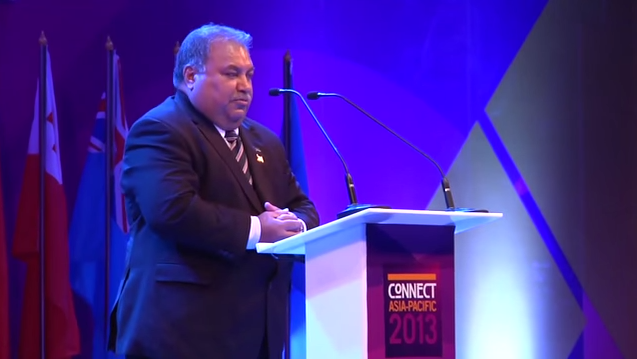When it comes to uncovering human rights abuses in immigration detention, or examining the problems with offshore processing, the Daily Telegraph isn’t exactly known for its hard-hitting coverage.
The Sydney tabloid quickly fell into what can only be described as a very public love affair with Scott Morrison after he ascended to the ministry, on one occasion running a puff piece, an op-ed by Morrison, and an editorial that read as if it had been written by his mother, all on the same day.
Not content with helping the Coalition find a wider audience for its press releases, the paper today printed an opinion piece by Nauruan President Baron Waqa, which hit out at the media coverage of his island nation. The nation’s leader attacked the foreign press, while defending his country as Christian nation where refugees and locals live in harmony and “are regularly seen swimming, dining out and enjoying a lifestyle that is safe”.
The problem is Waqa’s memory appears to have failed him. To help the beleaguered President we’ve added a little context to some of the claims he made in the piece.

Keeping Media At A Distance
The page 13 op-ed ran under the headline ‘Nauru Mocked By Media Bullies’. It’s true, the international press has been tough on Nauru – or more specifically, on Waqa and his government. Waqa hits out at the “lack of understating about Nauru and our lifestyle” which has been “highlighted in the way many foreign journalist report about issues in Nauru”.
And he’s absolutely right, there is a big impediment preventing foreign journalists from covering Nauru on its own terms, and coming to a fuller understanding of the people who live there and the issues they face.
What Waqa neglects to mention is that the impediment is an $8,000 fee his government introduced for any journalist who wants to apply to go to the island, a fee that does not guarantee the granting of a visa. Journalists have been effectively kept off the island since its introduction.
Meanwhile, Nauru has seen a crackdown on media, including social media, and political expression, with legislation limiting free speech.
The US State Department has expressed concern about the Nauruan government restricting accesses to Facebook.
Don’t Mention The (Alleged) Bribes
While the media crackdown benefits the Australian government by making it nigh on impossible to report on what is happening in and around the island’s immigration detention centre, it also helps the Nauruan President.
Waqa defends his own government in the Tele piece, which he says was elected “overwhelmingly”, with the Nauruan people wanting stability after “previous governments had let down our people and were rife with cronyism and corruption.”
In positioning himself as a one-man Nauruan ICAC it somehow slipped the President’s mind to mention the he and his justice minister appear to have solicited tens of thousands of dollars from a mining company, who were then able to buy off the country’s dwindling phosphate stock at a bargain price, to help them win that election.
To be fair, the Telegraph did make an oblique reference to this in a news piece they ran based on the op-ed, though it didn’t go into detail. The ABC’s Hayden Cooper, who broke the story, hasn’t had as much luck as the Telegraph in getting comment from Waqa.
The #Nauru President has repeatedly declined @abc730 offer to respond to our story. Prefers the no-question approach of @dailytelegraph
— Hayden Cooper (@haydencooper) August 2, 2015
Well I've been blocked by @Republic_Nauru. I guess that's a "no" to the interview request then. #Nauru
— Hayden Cooper (@haydencooper) August 3, 2015
Waqa’s Law
“With no knowledge, many in the media cried that the rule of law was dead in Nauru yet the truth was the complete opposite,” writes Waqa.
In fact, the criticism of the breakdown of the rule of law on Nauru has been spearheaded by former members of its judiciary, including (the somewhat appropriately named) Peter Law, who was sacked as the country’s chief magistrate and deported in 2014. When Law appealed to the courts an injunction was granted to stop his deportation by the country’s chief justice Geoffrey Eames, who then had his own visa cancelled.
Law has since described Nauru as a “rogue state”.
Law had been acting as the coroner on Nauru before he was ordered off the island. He had been supposed to run a coronial inquiry into the death of Nauru’s justice minister’s wife, who burned to death in her own front yard, which police reported was an accident. His removal from the island ensured he could never begin the inquiry.
A Hard Decision For The Opposition
“Like any government which has tackled reform, we have been criticised for making the hard yet necessary decisions,” Waqa notes.
These hard moves have included arresting and charging opposition MPs and cancelling the passports of others, a ploy 80 legal academics in Australia and New Zealand recently urged Julie Bishop to respond to.
Pressure has been mounting on Nauru in the wake of these incidents, with New Zealand in particular increasing its criticism of late.
But Waqa is adamant in his op-ed the criticism of his country stem from refugee advocates, “so-called human rights lawyers”, and “certain journalists who relish the opportunity to use Nauru as a punching bag”.
Perhaps members of New Zealand’s parliament, who recently passed a motion lamenting attacks on the judiciary, and removal of civil and political rights in Nauru, just haven’t been reading enough of the Daily Telegraph to know any better.
The Telegraph's readers certainly seem to agree with Waqa's critique.

Donate To New Matilda
New Matilda is a small, independent media outlet. We survive through reader contributions, and never losing a lawsuit. If you got something from this article, giving something back helps us to continue speaking truth to power. Every little bit counts.




